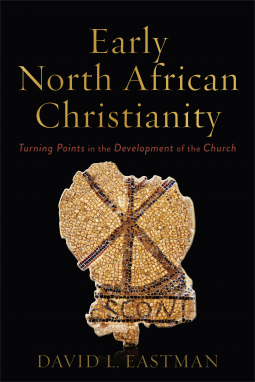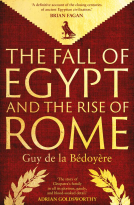
Early North African Christianity
Turning Points in the Development of the Church
by David L. Eastman
This title was previously available on NetGalley and is now archived.
Send NetGalley books directly to your Kindle or Kindle app
1
To read on a Kindle or Kindle app, please add kindle@netgalley.com as an approved email address to receive files in your Amazon account. Click here for step-by-step instructions.
2
Also find your Kindle email address within your Amazon account, and enter it here.
Pub Date 17 Aug 2021 | Archive Date 17 Oct 2021
Baker Academic & Brazos Press | Baker Academic
Talking about this book? Use #EarlyNorthAfricanChristianity #NetGalley. More hashtag tips!
Description
Advance Praise
“This book skillfully weaves history and reflection into a highly accessible account of North African Christianity. Eastman’s selection of important historical figures helpfully frames essential historical and theological issues relevant for Christian discourse today. The book addresses thoughtful questions that make it a valuable resource for a wide array of readers in disciplines beyond church history. This title is indispensable for any reader, beginner or seasoned scholar, who wants to understand North Africa’s early contributions to fundamental issues of the Christian faith.”—Kyama Mugambi, Pan Africa Christian University; senior researcher, Centre for World Christianity, Africa International University
“Eastman’s deep knowledge and love of his subject are evident on every page of this both learned and accessible book. Above all, this work offers a compelling and insightful introduction to the faith, context, and practices of early African Christianity that will enrich readers’ grasp of its decisive influence on the legacy of the Western church.”—Robin Jensen, Patrick O’Brien Professor of Theology, University of Notre Dame
“Eastman, a renowned scholar of early Christianity in general, has focused his attention on the early African Christian voices in particular. In so doing, he has given his readers a gift: an introduction to this underappreciated school of ancient wisdom through its key representatives, such as Perpetua, Tertullian, Cyprian, and Augustine. What is more, he is able to present these invaluable voices in a way that speaks to contemporary readers’ interests and concerns. Any student of Christianity’s past who feels ill-informed about what role ancient North Africans played in the faith’s earliest developments will want to add this book to their reading list.”—David Wilhite, professor of theology, Truett Theological Seminary, Baylor University
“David Eastman is an eminently trustworthy historian as well as a man of deep faith. He is, in fact, one of a very small number of scholars most qualified to write on the subject of North African Christianity. Eastman makes the rich history of early African Christianity accessible, even to those who have not yet studied this treasure, and yet, even scholars and the well-read will learn things from this book. Anyone interested in the story of the origins of Christianity will love this book.”—James L. Papandrea, professor of church history and historical theology, Garrett-Evangelical Theological Seminary
Available Editions
| EDITION | Other Format |
| ISBN | 9781540963673 |
| PRICE | US$26.00 (USD) |
| PAGES | 192 |
Featured Reviews
 Scott C, Reviewer
Scott C, Reviewer
David Eastman offers a valuable contribution to the church in Early Christian history. The style is conversational which will hopefully appeal to the intended audience. He offers a simple introduction into the life and works of some important early Christian works while also showing the importance of considering the global nature of Christianity.
An introduction to the Christian history of north Africa, particularly modern Tunisia, during the days of the Roman Empire, specifically focusing on the martyrdom of Perpetua and Felicity, Tertullian, Cyprian, the Donatist controversy, and Augustine.
I want to underscore the work is introductory; the author traces developments in the faith in ways that are often sweeping and highly generalized. With Perpetua and Felicity he emphasizes lay spirituality and sees space for the influence of Montanism; Tertullian is recognized for who he is and his standing is given more credibility than in past days; I have to wonder if both trends are taking place as a general re=assessment of Montanism within Evangelicalism on account of the influence of Pentecostalism/the Charismatic movement. The author does well at expressing the rigor of Tertullian and Cyprian and how that would lead to the crisis of the Donatist controversy, which is also well explained. The author is judicious with Augustine, lauding his ability and influence while recognizing how he went a bit too far with his views on grace and predestination when disputing with the Pelagians.
As an introductory work it does well to show how north African Christians strongly influenced the trajectory of Western Christianity. Recommended to that end.
 Andrew W, Reviewer
Andrew W, Reviewer
Some of the most important influences on the development of Christianity came out of North Africa in the first few centuries after the New Testament was written. The lives and writings of these North African Christians are worth studying. Early North African Christianity by David L. Eastman is a helpful overview of the subject, focusing on a few significant events and people, all of whom have left a permanent mark on the Christian faith.
Eastman highlights lesser-known figures like Perpetua, the Montanist movement (akin to the Charismatic movement), and Cyprian of Carthage as well as Tertullian (why we refer to God as "Trinity"), and Augustine (a major figure in Protestant/Catholic debates). He explains the context in which they lived and does an excellent job showing their relevance for today.
I was already familiar with a lot of the people and ideas presented in the book from my own studies in seminary, but it was a welcome refresher. Because the book focuses on five main “turning points,” the subject was narrower than what I had studied before, and I appreciated the additional details and analysis the book provided. That said, it is not written for “academics” (whoever they are). I could see anyone from high school on up enjoying it.
I don’t know the specific theological camp the author comes from, but I will point out that his date conventions (Before Common Era (BCE), Common Era (CE)) are not what I see in most books written by or for Christians (Before Christ (BC), Anno Domini (AD). Also, he is very charitable toward every side in the early debates he covers, which is not necessarily a positive. Some people and their beliefs were (and are) condemned as heretics by nearly all Christian groups. These misgivings aside, I heartily recommend Early North African Christianity.
Note: I received a review copy of this book from the publisher.
Quotes:
Christianity has been in Africa since the beginning. In fact, it is very likely that there were Christians in Africa before there were Christians in Europe.
The sacrifice was very simple. It involved taking a pinch of incense, throwing it into a fire, and saying something like, “Caesar is lord.” It was not a statement of theological conviction. It was primarily a statement of patriotism to the Roman state. Failing to offer this sacrifice came to be seen as an act of treason.
Early church sources tell us that a public part of the Christian worship service was open to everyone, but before the celebration of the Lord’s Supper, or Eucharist, those who were not baptized were required to leave. In these secret meetings people thought that the Christians were plotting to overthrow the government or doing something else dangerous. … The Romans were known for many things, but failing to deal with potential threats was not one of them.
I understand that is difficult to imagine government officials taking bribes (insert sarcasm here), but in the ancient world sometimes this happened.
In some of his sermons [Augustine] deals with people from his congregation who were living unholy lives, and in other sermons he seems frustrated by poor attendance. (Modern pastors often find themselves dealing with the same issues.)





